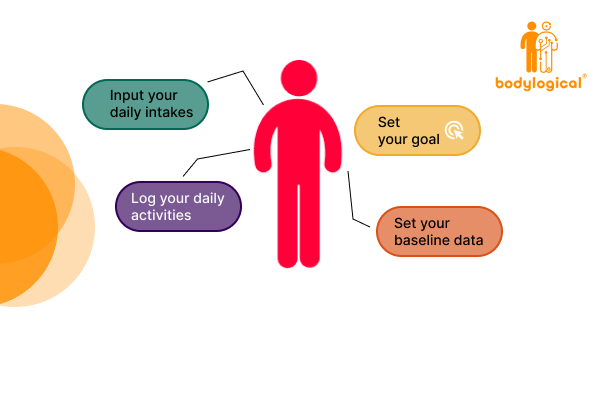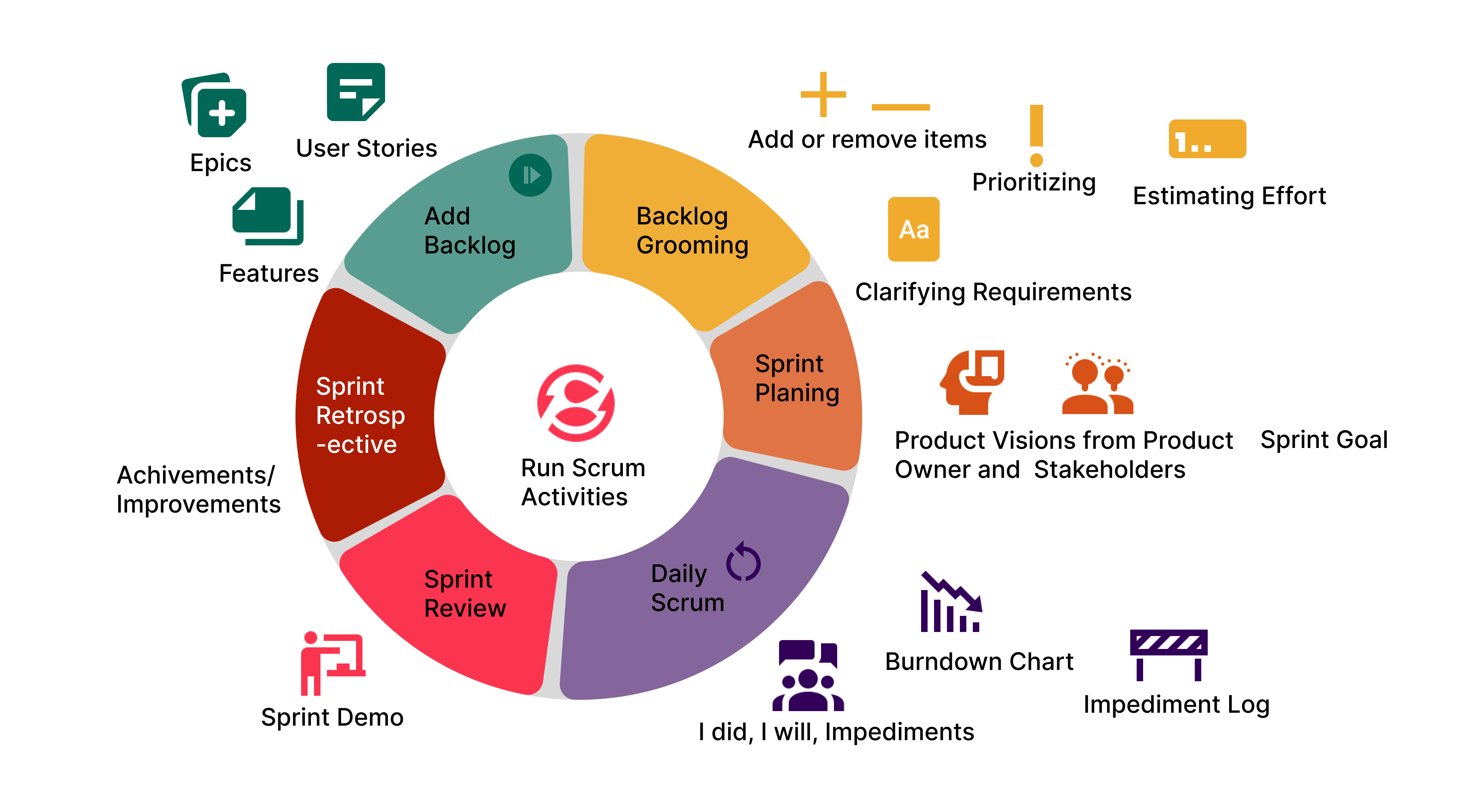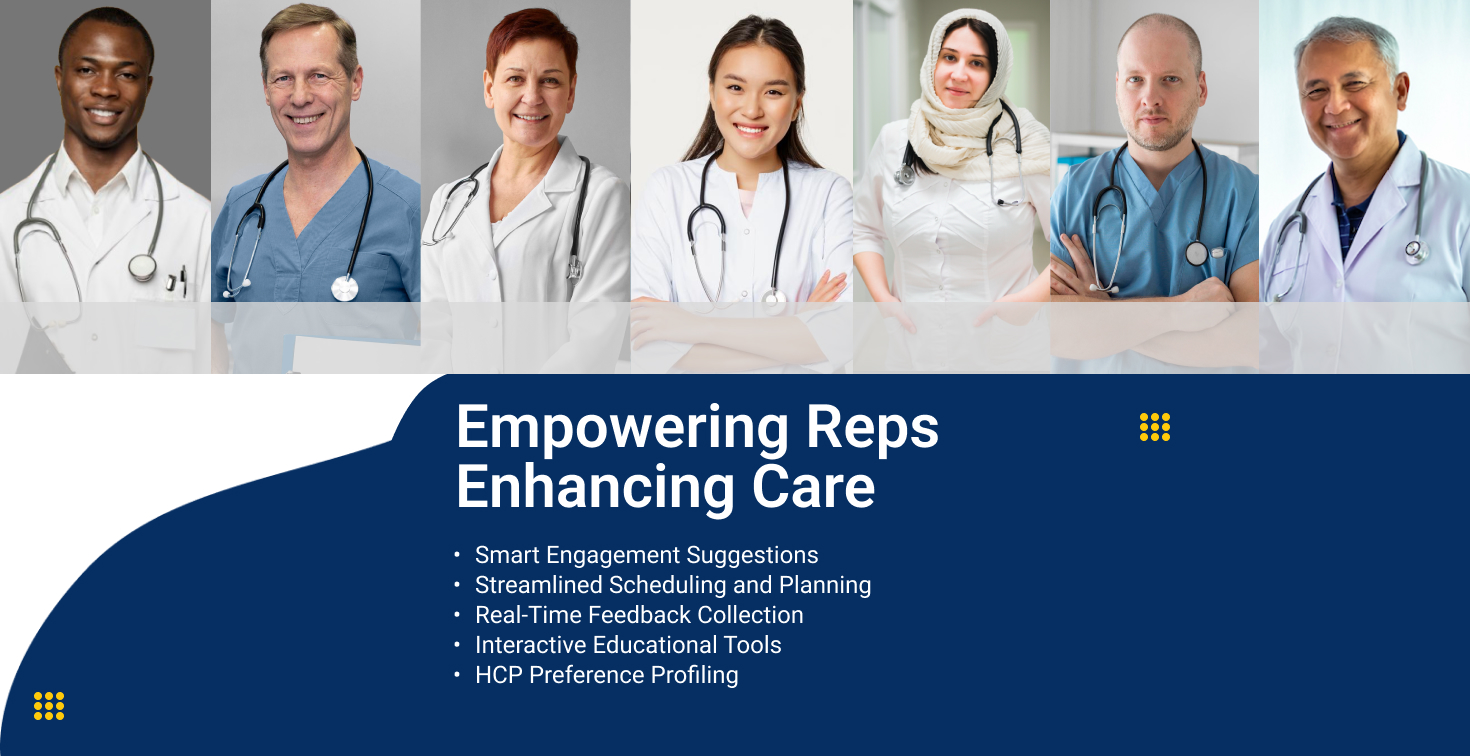- Bodylogical
- Project Archive
Role: Business Analyst Responsibility: Requirement Management, Scrum Facilitation, Agile Implementation Client: Sandbox Products and Takeda Tool Used: Jira, Trello, Microsoft DevOps, Sketch, Adobe XD, InVision Was on Project: March 2023 - September 2024

Project Overview
Bodylogical is a PaaS platform designed to leverage physiological and pathological models to predict the trajectory of individuals or patients. The platform evolved to include a website, iOS app, and progressive web app, catering to a diverse range of healthcare clients. Takeda, one of its primary clients, utilized Bodylogical to meet their specific needs.
I joined the Bodylogical project in May 2018, focusing on developing its sandbox products and successfully commercializing them for Takeda.
My Responsibilities
- Requirement Management: collaborated with stakeholders to gather, define, and prioritize requirements to align product development with client goals.
- Scrum Facilitation: led and facilitated Scrum ceremonies to ensure effective team collaboration and timely delivery of sprints.
- Agile Implementation: applied Agile best practices to promote continuous delivery, adaptability, and alignment with evolving client requirements
My Contributions
- Built a self-paced health management sandbox (0-to-1) for chronic patients using physiological and pathological models.
- Supported three product line iterations through wireframe design, product backlog management, and Scrum planning.
- Collaborated with wider stakeholders to ensure product features were user-preferred and prioritized for timely release.
- Delivered solutions for healthcare clients like Takeda. Addressing conditions such as inflammatory bowel disease (IBD), sleep disorders, and bladder issues.
Key Highlights of My Work
Using Takeda’s Project as an Example
Crohn's disease is a highly individualized condition, with patients responding differently to various prescriptions. Takeda sought to empower gastroenterologists by providing tools to identify the most effective treatment options for patients with Crohn’s disease.
To address this challenge, Takeda collaborated with Bodylogical to develop a sophisticated pathological model capable of predicting clinical outcomes for individual patients based on specific medications.
My Role in Takeda’s Project
In my role as a hybrid business analyst, my routine involved a blend of activities(Picture 1), including:
- Requirement Gathering: Collaborated with cross-functional, multi-location stakeholders to develop detailed requirements and user stories that aligned with client objectives.
- Product Backlog Management: Refined and managed the product backlog to ensure alignment with stakeholder priorities and project goals.
- Stakeholder Communication: Conducted regular stakeholder reviews to gather feedback, align deliverables, and ensure the product met expectations.
- Design Collaboration: Partnered with Bola, the Front-End Developer, to translate user requirements into functional and visually appealing design specifications.
- Scrum Facilitation: Organized and facilitated Scrum ceremonies, including Sprint Planning, Daily Scrums, Sprint Reviews, and Retrospectives, to promote seamless team collaboration.

Picture 1: A visual diagram depicting my role and responsibilities
Outcome and Impact
The Bodylogical platform, tailored for Takeda, was successfully launched in March 2020. The impact of the project was significant:
- Better Prescription Fit: Patients received treatments tailored to their unique physiological and pathological profiles.
- Improved Clinical Outcomes: Personalized prescriptions led to better health outcomes and enhanced quality of life.
- Empowered Decision-Making: Gastroenterologists gained actionable insights to refine treatment strategies for managing Crohn’s disease.
Learn More
To explore more about the Bodylogical platform and its collaboration with Takeda, visit: Takeda Announcement on Bodylogical.
Read More Of My
Case Studies
These are my older projects or collabrations that didn't make it into a full case stuy.
Deliver Deal Value
Unlike many of my other projects in the health and pharmacy sectors, the Delivering Deal Value (DDV) focuses on driving maximum value from Mergers and Acquisitions (M&A) transactions. DDV leverages a professional's extensive industry expertise to support organizations in becoming "Day One ready" and realizing the anticipated synergies from their M&A activities.
I contributed to a key tool within DDV that efficiently manages Transition Service Agreements (TSAs) — critical for ensuring smooth operational transitions during M&A deals. My role as a Business Analyst involved collaborating closely with multiple teams to ensure the successful development and implementation of this tool.
- Requirement Management: I worked with consultants and fellow BA Meichen Zhou to gather, document, and prioritize requirements in user stories using Jira. This process ensured that business needs were translated into clear, actionable tasks for development.
- Collaboration with UX and Development Teams: I partnered with UX designers to review product drafts and ensure that design elements aligned with user needs. Additionally, I worked alongside developers to support the implementation of user stories into functional features.
- Scrum Facilitation: I facilitated scrum activities, including daily stand-ups, sprint planning, and retrospectives, helping the team stay aligned and on track to meet deadlines and deliverables.

Picture note e.g.: DDV help entities to do HR management by merging similar departments
Learn more about the DDV project at: PwC DDV Consulting.
E-Onboarding System Architecture
The E-Onboarding initiative aimed to streamline workflows by leveraging historical data and identifying reusable resources to boost productivity and collaboration across teams.
I conducted stakeholder interviews and designed a system architecture that connected key tools used by Business Analysts, Developers, and QA engineers, such as Jira for user stories, GitHub for code management, and CodeScan for quality analysis.The architecture was designed to reduce redundant work, improve consistency, and enhance efficiency, enabling teams to quickly apply existing solutions to new challenges.

Picture note: E-onoarding helps BA, Developer, and QA work in synergy
SmartRep
SmartRep* is an AI-driven tool designed to optimize pharmaceutical sales strategies by empowering representatives to engage more effectively with healthcare providers (HCPs). With features such as engagement suggestions, streamlined scheduling, real-time feedback collection, and HCP preference profiling, the platform helps reps improve interactions and boost sales performance.

Picture note: a picture illustrating smartrep helping HCPs to deliver enhanced cares
While working on the project for Eli Lilly, I contributed to configuring and refining strategies tailored for mobile platforms. I conducted an in-depth business impact analysis using data from Veeva and WeCom, generating actionable insights to enhance engagement effectiveness.
I did an in depth user analysis that revealed varied attitudes among sales representatives toward the tool. New sales reps and those transitioning to expanded domains found it invaluable for quickly understanding HCP profiles and receiving actionable engagement suggestions. In contrast, experienced reps perceived limited benefits, as their established routines and relationships required minimal support from the tool.
Interestingly, SmartRep was highly favored by supervisors, including sales managers, regional managers, and general managers, who relied on its statistics to track rep performance and evaluate sales strategies. For instance, at MSD, regional managers frequently utilized SmartRep to plan their work and prepare implementation reports for senior leadership.
My work helped SmartRep deliver tailored value across diverse sales roles, enhancing productivity, enabling data-driven decision-making, and improving overall engagement outcomes for the client.
*A placeholder name is used as this AI tool provides tailored services to various companies, each with its own project name.
Read More Of My


